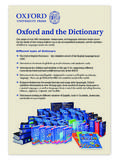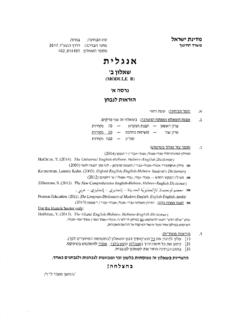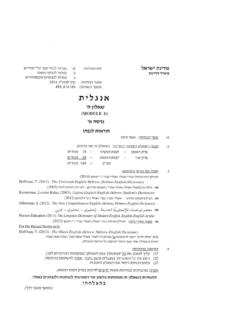Transcription of MISCELLANY 327 Klein, Ernest. 1966. A …
1 MISCELLANY MISCELLANY Klein, Ernest. 1966 . a comprehensive etymological dictionary of the english Language. New York: Elsevier. Krapp, George Philip. 1925. The english Language in America. 2 vols. New York: Century. Rpt. New York: Ungar, 1960. OED2. The Oxford english dictionary . 1989. Rev. ed. Oxford: Clarendon. ODEE. The Oxford dictionary of english Etymology. 1966 . Oxford: Oxford UP. Quirk, Randolph, Sidney Greenbaum, Geoffrey Leech, and Jan Svartvik. 1985. A comprehensive Grammar of the english Language. New York: Longman. RH2. The Random House dictionary of the english Language. 1987. 2nd ed., unabr. New York: Random. W3. Webster's Third New International dictionary of the english Language.
2 1981. Spring- field, MA: Merriam. ALAN R. SLOTKIN and ROBERT F. BODE Tennessee Technological University WIMP english With the contemporary shift away from traditional work requiring brawn to the epicene service economy relying on brain power, dexterity, and "good customer relations," we observe a concomitant change in speech patterns whereby directness and plainspokenness are regularly avoided in favor of indirection and blandness. These patterns are especially typical of public pronouncements and the speech of persons who must take care to be as neutral or noncommittal as possible. We propose the designation WIMP english for such speech. In this note, we would like to call attention to some features of Wimp english as a variety of American english , particularly the widespread use of the phrase if you will as a kind of self-glossing anodyne employed to attenuate or neutralize the force of words.
3 We hope that this will spur other miscellaniasts to widen the discussion by contributing further examples. Despite the fact that elementary handbooks of forceful writing routinely warn against the use of the passive instead of the active voice, it is one of the most entrenched means by which blandness is achieved. The passive neces- sarily means a diminution in force because agents are always grammatically less central than subjects, quite apart from changes in syntax (cf. Miss Smith paid attention vs. Attention was paid by Miss Smith). But there are many other grammatical means of achieving toothlessness, three of which we would like to discuss. The first is the use of the modal would after the first-person singular pronoun with verbs such as hope, think, imagine.
4 The combination-I would hope-is so commonplace that one tends to forget its peculiarly blunted character: I would hope that Jane would pay her debts is far more circumspect Klein, Ernest. 1966 . a comprehensive etymological dictionary of the english Language. New York: Elsevier. Krapp, George Philip. 1925. The english Language in America. 2 vols. New York: Century. Rpt. New York: Ungar, 1960. OED2. The Oxford english dictionary . 1989. Rev. ed. Oxford: Clarendon. ODEE. The Oxford dictionary of english Etymology. 1966 . Oxford: Oxford UP. Quirk, Randolph, Sidney Greenbaum, Geoffrey Leech, and Jan Svartvik. 1985. A comprehensive Grammar of the english Language.
5 New York: Longman. RH2. The Random House dictionary of the english Language. 1987. 2nd ed., unabr. New York: Random. W3. Webster's Third New International dictionary of the english Language. 1981. Spring- field, MA: Merriam. ALAN R. SLOTKIN and ROBERT F. BODE Tennessee Technological University WIMP english With the contemporary shift away from traditional work requiring brawn to the epicene service economy relying on brain power, dexterity, and "good customer relations," we observe a concomitant change in speech patterns whereby directness and plainspokenness are regularly avoided in favor of indirection and blandness. These patterns are especially typical of public pronouncements and the speech of persons who must take care to be as neutral or noncommittal as possible.
6 We propose the designation WIMP english for such speech. In this note, we would like to call attention to some features of Wimp english as a variety of American english , particularly the widespread use of the phrase if you will as a kind of self-glossing anodyne employed to attenuate or neutralize the force of words. We hope that this will spur other miscellaniasts to widen the discussion by contributing further examples. Despite the fact that elementary handbooks of forceful writing routinely warn against the use of the passive instead of the active voice, it is one of the most entrenched means by which blandness is achieved. The passive neces- sarily means a diminution in force because agents are always grammatically less central than subjects, quite apart from changes in syntax (cf.)
7 Miss Smith paid attention vs. Attention was paid by Miss Smith). But there are many other grammatical means of achieving toothlessness, three of which we would like to discuss. The first is the use of the modal would after the first-person singular pronoun with verbs such as hope, think, imagine. The combination-I would hope-is so commonplace that one tends to forget its peculiarly blunted character: I would hope that Jane would pay her debts is far more circumspect 327 327 AMERICAN SPEECH (1993) than I hope that Jane pays her debts. Politicians, managers, bureaucrats, and flak-catchers of all stripes, including academics, are often heard uttering such locutions.
8 In an interview with the director Brian De Palma concern- ing the film version of Tom Wolfe's novel The Bonfire of the Vanities, De Palma is quoted as saying, "The book caused a tremendous furor when it came out. I would hope that the film would have [sic] the same furor" (New York Times, 16 Dec. 1990, 42). The effect of the would here is to distance the speaker from hope: he is afraid not only to hope that the film will have the same success as the book but even to allow himself the hope. The catachresis of the verb have with respect to furor (signaled by our sic) only underscores the pusillanimity. This is linguistic wimpishness par excellence. The second feature of Wimp english is the use of the participle or deverbal adjective, particularly -ive, plus of, instead of the verb: They were admiring of her coiffure, We are very supportive of his initiative (Hamp 1988); This trait is indicative of a certain mentality, They are desirous of the public's approval).
9 The adjectives, being stative, are necessarily attenuated vis-a-vis the finite verbs which they are correlated with (or derived from) because as nominalized verbs they lack the main property of a transitive verb, its transitivity, specifically its ability to govern the DIRECT object. Nominalization also entails the further consequence that the sentence will be longer, often leading to convolutions, hence a further attenuation of semantic directness. Another likelihood is that a sentence built on an adjectival construction like is indicative of will be a simple (subject-predi- cate) sentence, although possibly "swollen by parentheses and modifiers" (Wells 1960, 216).
10 The combination of parataxis and extended length have the effect of deflecting semantic force. Finally, and most intriguingly, we would like to comment on a feature of Wimp english that is relatively new. On 27 July 1990, one of us was sitting in the Manhattan office of the American Automobile Association when he overheard a woman say to an agent, "My dilemma, if you will, is that.." Now, judging from the context, dilemma was being used in a perfectly straightforward way: the woman had only a limited amount of time in which to visit two destinations and had to make a choice. The use of a somewhat bookish word apparently made the speaker append the tag ifyou will, AS IF THE WORD'S USE NEEDED TO BE SANCTIONED BY THE HEARER.




